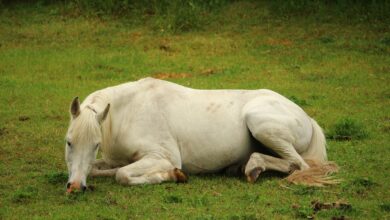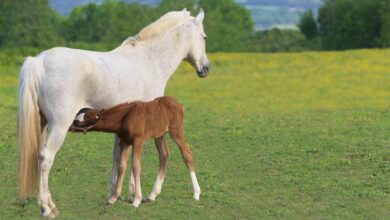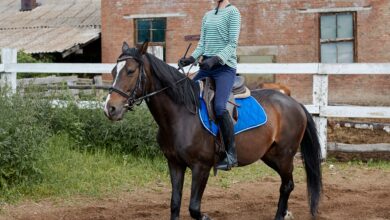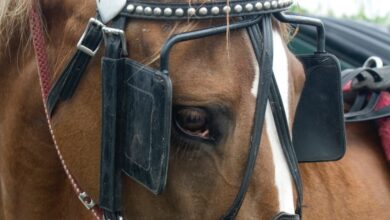Bringing your horse home: the first days
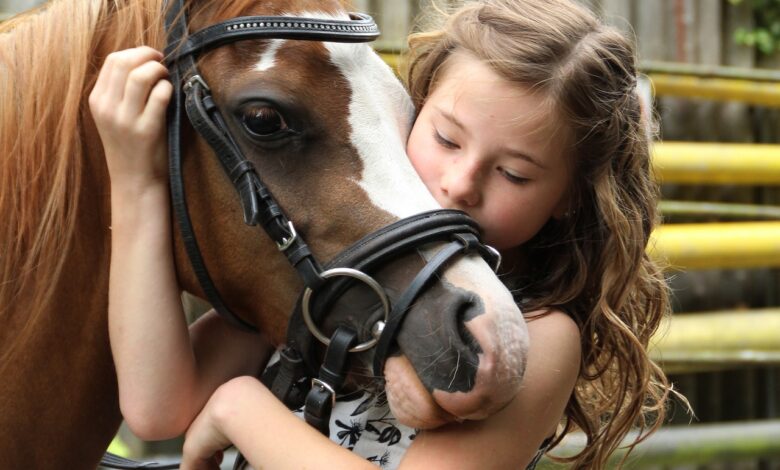
What to expect when you bring your new horse home
Buying a new horse and bringing it home with you is very exciting, even for experienced horse owners. It’s an exciting time for the horse too. They will have been uprooted from familiar surroundings and separated from their fellow grazers. The water may taste different. Food may change slightly and things like shelters, stalls, and fences will be in different places. There are new people, partners and schedules to meet. All the changes can make your horse a bit nervous. Some will feel very restless and take a while to adjust, while others will feel comfortable quickly.
Before your horse arrives
Before your horse arrives, you’ll want to have a few things ready. Make sure you have an adequate supply of hay, or that your pasture grass is healthy and plentiful enough to feed your horse. Have a fresh, clean water source available. And make sure there is a place for your horse to shelter. You may want to prepare a stable if your horse will be in part of the day or night. This means bedding must be ready and hay and water close at hand.
Your horse must be healthy before you bring it home. You don’t want to be responsible for a chokehold outbreak or other contagious diseases.
The horse’s new home
Before your horse arrives, you’ll want to make sure your horse’s new home is safe and comfortable. Inspect fences, stall walls, gates, gates, and the ground for hazards where your new horse could get hurt. Make sure all fences are sturdy and in good repair. A nervous horse may jump over a stable door, try to break through a fence, or climb a gate. Make things as safe as possible. At first, your horse’s behavior may seem quite different compared to its old home. Most horses settle down after a transition period. Moving to a new home is very stressful for a horse. Some horses take it in stride, others are more hesitant.
Peers and bonding
If there are other horses, you’ll want to have a spot where your horse can see them from a distance, but not immediately blend in. We’ve discussed that in Introducing a New Horse to a Herd, so you might want to check it out. Expect a few nervous moments before everyone calms down.
You’ll also want a place to tether your horse securely During brushing, your horse may or may not like certain brushes, or be brushed on certain areas of his body. Most horses like to have their chest scratched, and this can be a way to make friends. Take care when brushing or scratching around the flanks and belly as these can sometimes be tender spots. Go slow and use these sessions to learn about your horse and learn about the things you will need to work on. Try to be with your new horse as much as you can, so he can get used to how you do things.
Riding
If you feel confident and your horse seems comfortable, you’ll probably want to get on your new horse right away. Keep in mind that your horse will be in a new environment and this may affect its behavior. Be firm, but don’t be too demanding the first few times. This is a getting-acquainted period for both of you, so you’ll want to take it one step at a time. The horse will want to look around and maybe even smell things. This is a natural curious behavior.
Food
At first, you’ll want to keep your new horse’s feed consistent with what it was fed before the move. Make any subsequent feeding changes slowly. If your horse hasn’t been kept on pasture, be sure to slowly introduce him to the lush grass. A quick transition from hay to grass can cause problems, such as diarrhea or even laminitis. If the horse is used to a certain type of hay, you may want to buy a few bales so you can slowly change it. Make sure you have salt available. You can even show the horse where to find water, shelter, and hay, especially if it lives alone. However, a horse must have some company. Horses are herd animals and are most comfortable with other horses or a companion animal.
What to watch
If your horse is losing or gaining weight, being beaten by other herdmates, or showing other signs of stress, it’s time to make some adjustments. It may take weeks for your horse to fully acclimate to its new home, depending on how different it is. The first year is a learning experience for both of them as they go through all the seasons and different situations together. The real bond between a horse and its owner takes time, as does your horse’s adaptation to its new home.



